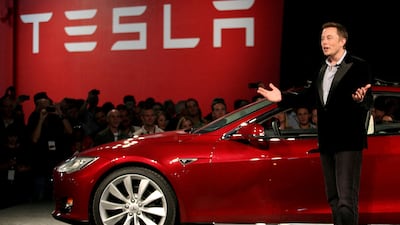Live updates: follow the latest news on Russia-Ukraine
Tesla chief executive Elon Musk said on Sunday the US electric car maker and his rocket company SpaceX are facing significant inflationary pressure in raw materials and logistics.
Musk in a tweet also asked about inflation rate outlook and said his companies "are not alone", retweeting an article saying the Ukraine-Russia conflict sent commodity prices to their highest levels since 2008.
Russia's military offensive in Ukraine has been pushing up the prices of metals used in cars, from aluminium in the bodywork to palladium in catalytic converters to the high-grade nickel in electric vehicle batteries, and drivers are likely to foot the bill.
While metals have not yet been the target of Western sanctions, some shipping companies and car parts suppliers are steering clear of Russian goods, putting more pressure on vehicle manufacturers already reeling from a chip shortage and higher energy prices.
Escalated by housing, food and gas prices, the US consumer inflation had its steepest spike in the last four decades, likely cementing the case for an interest rate hike by the Federal Reserve.
Tesla's shares, which closed 5 per cent lower at $795.35 on Friday, have lost about 25 per cent year-to-date.
The electric-car maker last week raised prices of its US Model Y SUVs and Model 3 Long Range sedans by $1,000 each and some China-made Model 3 and Model Y vehicles by 10,000 yuan ($1,582.40). Mr Musk said in January that Tesla would not develop a $25,000 car he promised during 2020 battery day, saying he had too many things on his plate.
US electric vehicle maker Rivian Automotive said last week supply-chain issues could cut its planned production in half, citing soaring raw material prices and supply chain constraints.
Japan's Toyota Motor Corp said it would scale back domestic production by up to 20 per cent for April-June to ease the strain on suppliers struggling with shortages of chips and other parts.
Tesla and SpaceX did not immediately respond to Reuters' requests for comment.
Surging costs of raw materials made worse by Russia's military offensive in Ukraine could set back the dream of Tesla chief executive Elon Musk and other auto executives to create cheaper electric vehicles.
Meanwhile, rising prices of nickel, lithium and other materials are likely to slow and even temporarily reverse the long-term trend of falling costs of batteries, the most expensive part of EVs, hampering the broader adoption of the technology, Gregory Miller, an analyst at industry forecaster Benchmark Mineral Intelligence, had said last week.

